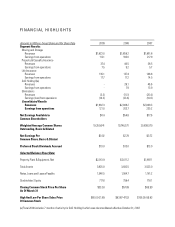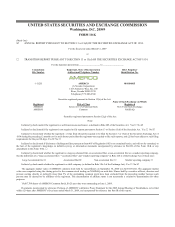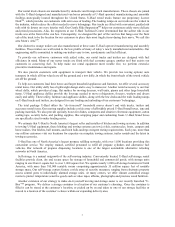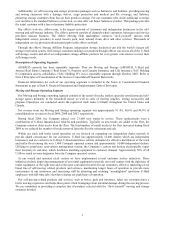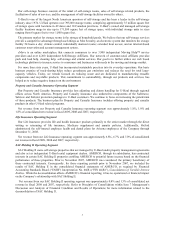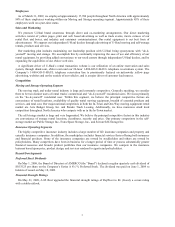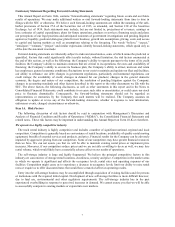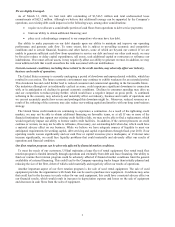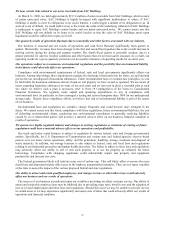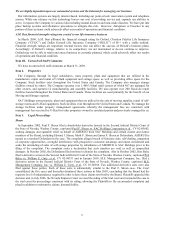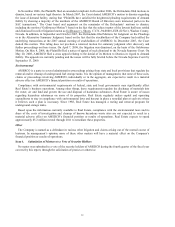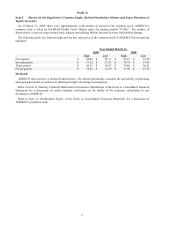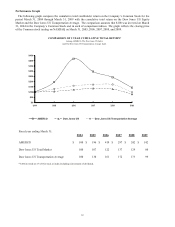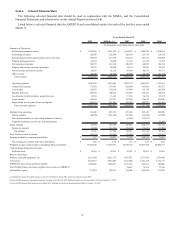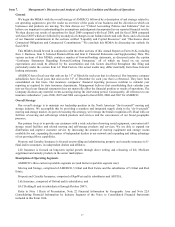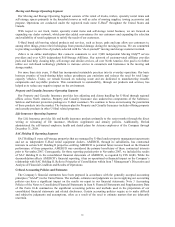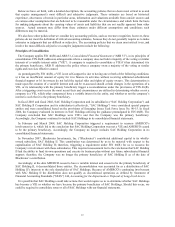U-Haul 2009 Annual Report Download - page 13
Download and view the complete annual report
Please find page 13 of the 2009 U-Haul annual report below. You can navigate through the pages in the report by either clicking on the pages listed below, or by using the keyword search tool below to find specific information within the annual report. 9
We obtain our rental trucks from a limited number of manufacturers.
In the last ten years, we purchased most of our rental trucks from Ford Motor Company and General Motors
Corporation. Our fleet rotation can be negatively affected by issues our manufacturers face within their own supply
chain. Also, it is possible that our suppliers may face financial difficulties or organizational changes which could
negatively impact their ability to accept future orders or fulfill existing orders. General Motors could lead to
shortages of new trucks and repair parts for existing trucks. Although we believe that we could obtain alternative
manufacturers for our rental trucks, we cannot guarantee or predict how long that would take and termination our
relationship with this supplier could have a material adverse effect on our business, financial condition or results of
operations for an indefinite period of time.
We seek to effectively hedge against interest rate changes in our variable debt.
In certain instances the Company seeks to manage its exposure to interest rate risk through the use of hedging
instruments including interest rate swap agreements and forward swaps. The Company enters into these
arrangements with counterparties that are significant financial institutions with whom we generally have other
financial arrangements. We are exposed to credit risk should these counterparties not be able to perform on their
obligations. Additionally, a failure on our part to effectively hedge against interest rate changes may adversely affect
our financial condition and results of operations. We are required to record these financial instruments at their fair
value while not affecting cash flow. Changes in interest rates can significantly impact this valuation resulting in non-
cash changes to our financial position.
We are controlled by a small contingent of stockholders.
As of March 31, 2009, Edward J. Shoen, Chairman of the Board of Directors and President of AMERCO, James
P. Shoen, a director of AMERCO, and Mark V. Shoen, an executive officer of AMERCO, collectively are the
owners of 9,342,598 shares (approximately 47.7%) of the outstanding common shares of AMERCO. In addition, on
June 30, 2006, Edward J. Shoen, James P. Shoen, Mark V. Shoen, Rosmarie T. Donovan (Trustee of the Shoen
Irrevocable Trusts) and Southwest Fiduciary, Inc. (Trustee of the Irrevocable “C” Trusts) (collectively, the
“Reporting Persons”) entered into a stockholder agreement in which the Reporting Persons agreed to vote as one as
provided in this agreement (the “Stockholder Agreement”). As of March 1, 2007, Adagio Trust Company replaced
Southwest Fiduciary, Inc. as the trustee of the Irrevocable “C” Trusts, and became a signatory to the Stockholder
Agreement. Pursuant to the Stockholder Agreement, the Reporting Persons appointed James P. Shoen as proxy to
vote their collective 11,017,321 shares (approximately 56.2%) of the Company’s common stock as provided for in
the Stockholder Agreement. For additional information, refer to the Schedule 13D’s filed on July 13, 2006 and on
March 9, 2007 with the SEC. In addition, 1,750,262 shares (approximately 8.9%) of the outstanding common shares
of AMERCO are held by our Employee Savings and Employee Stock Ownership Trust.
As a result of their stock ownership and the Stockholder Agreement, Edward J. Shoen, Mark V. Shoen and James
P. Shoen are in a position to significantly influence the business affairs and policies of the Company, including the
approval of significant transactions, the election of the members of the Board and other matters submitted to our
stockholders. There can be no assurance that the interests of the Reporting Persons will not conflict with the interest
of our other stockholders. Furthermore, as a result of the Reporting Persons’ voting power, the Company is a
“controlled company” as defined in the Nasdaq listing rules and, therefore, may avail itself of certain exemptions
under Nasdaq Marketplace Rules, including exemptions from the rules that require the Company to have (i) a
majority of independent directors on the Board; (ii) a compensation committee composed solely of independent
directors; (iii) a nominating committee composed solely of independent directors; (iv) compensation of our
executive officers determined by a majority of the independent directors or a compensation committee composed
solely of independent directors; and (v) director nominees selected, or recommended for the Board’s selection, either
by a majority of the independent directors or a nominating committee composed solely of independent directors. Of
the above available exemptions, the Company currently exercises its right to an exemption from the Nasdaq rule
requiring compensation of other executive officers, aside from the President, be determined by a majority of the
independent directors or the compensation committee.


